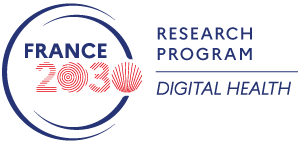pRecision mEdicine WIth loNgitudinal Data (REWIND)
Coordinators : Stephanie Allassonnière, Agathe Guilloux
Coordinating institution : Inria
Precision medicine, longitudinal data, statistical models, machine learning, deep learning, bayesian statistics
Longitudinal data are essential for understanding the progression of chronic diseases. They consist in the repeated observations of patients over time. Their analysis opens up new perspectives, not only for the better understanding of the natural history of the disease but it also allows earlier diagnosis, more precise prognosis, prediction of response to treatments or of the onset of adverse events. Modeling longitudinal data means designing models to improve patients’ medical care. These models have to take into account that the data have very different modalities (from organ images to patient pathways), time dependencies, they exhibit different paces of acquisition.
This project aims to address these challenges. To this end, we will focus on the development of new mathematical and statistical approaches for the analysis of multimodal multiscale longitudinal data. These models will be designed, implemented as prototypes and then transferred to an easy-used-well-documented platform where researchers from diverse communities, in particular physicians, will be able to analyze their own data set.
- A first work-package (WP1) will be devoted to models for time-to-event data. Existing methods often face with one or more of the following limitations: numerical challenges, lack of scalability, requirement of strong assumptions of the influence of the feature on the risk or intensity of events. This WP aims to propose new prediction models for personalized medicine. These prediction models will integrate repeated (possibly intensive) measurements of multiple exposures and/or (bio)markers, to predict complex health events. Longitudinal models may also include spatial dependence or more generally multimodal information with complex structures.
- The second work-package (WP2) will aim at developing advanced spatio-temporal (ST) models and AI tools to extract, if it exists, a set of ST features which characterize effects of different nature that may be associated either to post-treatment side-effects, to treatment responses or to natural disease progression.This could also help in improving our knowledge about the sensitivity of patients at an individual level. All the proposed models may suffer from two issues: the high dimensionality of the data and their relevance with respect to a clinical question.
- Work-package 3 (WP3) will propose new model selection criteria for longitudinal models. A second aspect of this WP will be to work in the Bayesian framework to enable the integrate expert knowledge. All the previous models belong to classical machine learning and statistical models where one aims at proposing equations to mimic the generation of the observations.
- Work-package 4 (WP4) will look at interpretable Deep-learning models to combine data-driven and model-based approaches in order to learn mechanistic parameters allowing the interpretable description of the disease progression. Particular focus will be given to the use of auto-encoder architectures for learning compact representations of the dynamics governing spatio-temporal relationship.
The resulting models and their careful implementation will allow the development of a new generation of decision support systems, which will help clinicians at the bedside to make more informed decisions for the patient. They will contribute to the development of precision medicine in several key areas.
| Laboratory or department, team | Supervisors |
| CRC – U 1138 Eq HEKA | Inserm, Inria, Sorbonne University, Paris Cité University
CHU Pitié-Salpêtrière |
| LJK – UMR5224, Eq STATIFY | Grenoble Alpes University, CNRS, Grenoble INP
Inria partner |
| ICM U 1127 – UMR7225 – Eq ARAMIS | Inserm, Inria, CNRS, Sorbonne University, APHP |
| Centre Inria Côte d’Azur, Eq EPIONE | Inria, Côte d’Azur University, Chaire 3IA |
| LBBE – UMR CNRS 5558 | CNRS, Lyon 1 University, VetAgro Sup,
Inria, Inserm, HCL partners |
| LPSM – UMR CNRS 8001 | CNRS, Sorbonne University, Paris Cité University |
| TIMC – IMAG- UMR 5525 | CNRS, UGA, VetAgro Sup,
Grenoble INP partner |
| BPH – U1219, Eq Biostatistique & CIC 1401 | Inserm, Bordeaux University,
ISPED, CHU Bordeaux partners |


